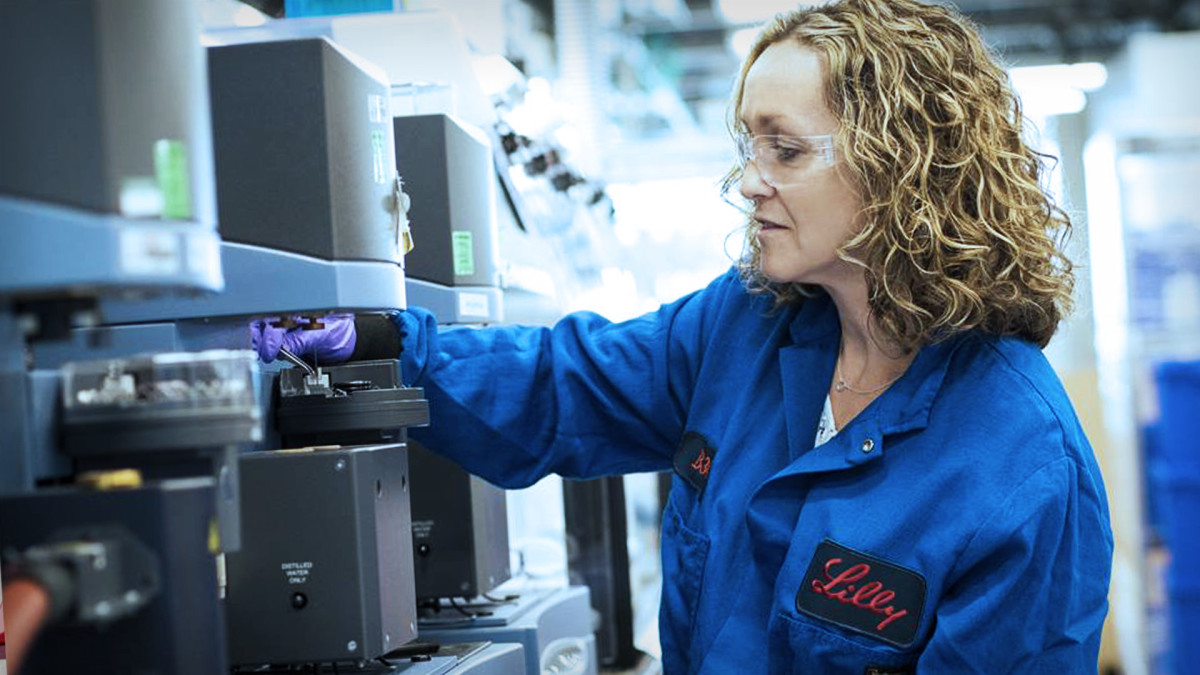
Pharmaceutical titan Eli Lilly (LLY) represents one of our country’s most storied companies.
Since its founding more than 140 years ago, Lilly has come up with everything from the world’s first commercially available insulin product (Iletin) in 1923 to its current blockbuster, diabetes/obesity treatment Mounjaro/Zepbound, launched about 80 years later.
Mounjaro and Zepbound are the same drug with the former used for diabetes and the latter for obesity.
The company is firing on all cylinders, analysts say. “Eli Lilly's innovative culture and strong financial commitment to developing the next generation of drugs set the company apart from its peers and fuel its long-term growth,” wrote Morningstar analyst Damien Conover.
“Lilly holds industry-leading growth potential, as the company is launching several new blockbusters and patent losses are fading.”

Eli Lilly
Lilly Fights Obesity Epidemic
Anti-obesity drug Zepbound is a game-changer for Lilly. It’s expected to be the top-selling drug in history. That’s because more than 40% of adults suffer from obesity, according to the National Institutes of Health.
Related: Cathie Wood buys $35 million of beaten-down tech stock
The Centers for Disease Control and Prevention reported in 2022 that obesity costs the healthcare system $147 billion a year.
The list price for a 28-day supply of Zepbound is $1,060 before insurance reimbursement or manufacturer discounts.
Lilly is taking advantage of its opportunity. Zepbound racked up 77,590 new U.S. prescriptions for the week ending March 8. That beat the drug’s main competitor, Novo Nordisk’s (NVO) Wegovy, for the first time, according to IQVIA, a healthcare information company.
Last week, Lilly and Amazon announced that Amazon Pharmacy will oversee some of Zepbound’s home delivery. That’s for prescriptions ordered through Lilly’s direct-to-consumer service.
If you’re going to take Wegovy or Zepbound, keep in mind that a lot of your weight loss may consist of muscle mass. And that obviously would make you physically weaker.
Also, like, with other weight-loss treatments, research indicates that Zepbound users regain some of the weight they lose after they end the treatment.
JPMorgan Analysts Take Action
The strength of Zepbound has led JPMorgan Chase analysts to lift their share price target for Lilly to $850 from $775. They left their rating unchanged at overweight. The stock recently traded at $764.
More Wall Street Analysts:
- Analyst who correctly warned Tesla stock could fall unveils new target
- Analysts race for new Palo Alto Networks price targets as shares plunge
- Analyst who forecast Nvidia stock could exceed $750 revamps target
After Zepbound’s rousing early performance, Lilly "remains optimally positioned" in the diabetes and obesity market, JPMorgan analysts said, according to The Fly. The company expects demand for this type of obesity drug to continue exceeding supply, they noted.
Morningstar’s Conover is bullish on Lilly too, assigning it a wide moat. That means he sees it with competitive advantages that will last at least 20 years.
“We view Eli Lilly’s execution as excellent,” he said. In the fourth quarter, revenue rose 28%, led by $2.2 billion in sales of Mounjaro, which now represents over 20% of total sales.
“With supply of Mounjaro/Zepbound expected to increase by at least 50% in 2024, robust growth looks likely since the market is already capacity-constrained,” Conover said.
To be sure, he thinks Lilly’s 130% total return over the past 12 months has left it vastly overvalued, putting fair value at $500.
“Even with our robust peak expectations of over $60 billion a year for Eli Lilly’s GLP-1 drugs in weight loss and diabetes, we still view the stock as overvalued,” Conover said.
The author owns shares of Eli Lilly.
Related: Veteran fund manager picks favorite stocks for 2024







